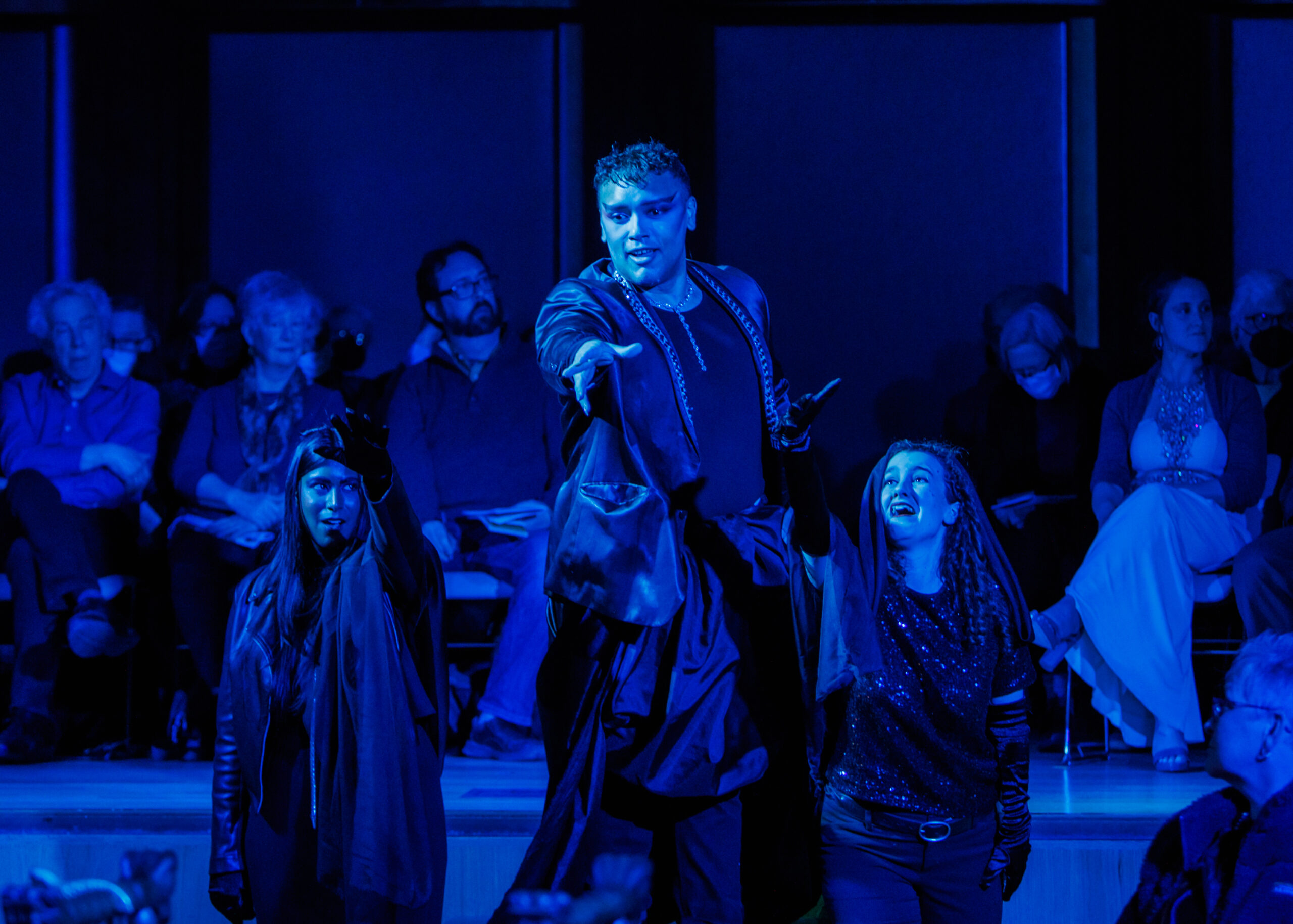Saturday, October 26, 2024
The Boston Camerata kicked off a historic 70th season earlier this month, which also marked eight years of the ensemble’s fruitful partnership with Longy.
Thanks to the Camerata’s artistic director and Longy faculty member Anne Azéma, the two organizations have been connected in mutually beneficial collaboration since 2016.

Longy alumni Monica Rajan (left) and Regina Stroncek (right) as Witches in the Camerata’s production of Dido & Aeneas
“The most rewarding part of my work is empowering my students and giving them the tools to continue working and growing without me intellectually, musically, and technically. The presence of the students in our performances and their musicianship and young energy also make the whole experience more meaningful to me, my colleagues, and the Camerata’s audience. Together, we prepare them best for the music world of 2024,” said Azéma.
Longy students looking to expand their musical horizons are granted opportunities to perform with the Camerata in one of their productions. Those individuals who participate help bring musical history to life by rounding out the cast of seasoned performers.
“I have learned immensely by working with world-class performers side-by-side as colleagues,” remarked Longy student Salomé Sandoval (MM ‘25). “I have learned not only to put into practice everything I have studied but to be flexible and open to shaping a collaboration towards a well-rounded program.”
At Longy, Azéma’s course, Exploring Monody, serves as a gateway to the Camerata’s work. Students who enroll prepare and rehearse for, and eventually perform in, an end-of-semester Camerata production—this year, it is The Play of Daniel, a fan–favorite production being reprised for the first time since 2020.
“Under the guidance of Anne, my colleagues and I researched the historical context and performance practice of this timeless play, while simultaneously participating in rehearsals with the Boston Camerata,” said Longy alum Lawson G. Daves (MM ‘15), who performed in a previous iteration of Daniel with the Camerata. “This fusion of performance and academia proved to be one of the most formative and impactful experiences of my musical education. Rehearsing alongside such high caliber musicians in a professional setting gave me a glimpse of the working musical world I would be graduating into.”
“One of the most surreal and delightful aspects of a singing career is suddenly finding yourself working alongside one of your musical idols and role models,” added Longy alum Clare McNamara (MM ‘13). “This is the experience of working with Anne and the Camerata. I’ve always admired how the Camerata approaches its programming; it’s so satisfying and refreshing to perform early music in a way that makes modern audiences truly care about what they’re hearing.”
Students who join the Camerata productions encounter a group of performers deeply committed to celebrating and reimagining the field of early music for future generations. The group accomplishes this mission through live, historically informed, professional performances; study and research into musical sources of the past; media projects; and community outreach and musical education.
“The Camerata takes a holistic approach to their productions and the narrative is infused into every aspect of the performance. From reciting The Aeneid before the opera to including the ensemble on stage as another character, I was constantly thinking about my role beyond what was written on the page,” said Longy alum Monica Rajan (MM ‘21).
The Camerata’s rich tapestry of early music is deeply intertwined with the vibrant spirit of Longy. The collaboration between the two organizations nurtures the talents of emerging musicians, while reinforcing the Camerata’s commitment to revitalizing the art form for future audiences.
“I believe this repertoire reinforces the idea that each musician in a high-level ensemble, while a distinguished artist in their own right, is only part of a larger artistic framework that depends on cooperation, coordination, and give-and-take,” commented Longy alum Grant Yosenick (MM ‘19).
For Longy students and alumni, this partnership is not just about the performance opportunities—it is about joining and contributing to a community dedicated to early musical exploration, growth, and preservation.
“Early music is the root of so many different styles and techniques of modern music. Studying diverse musical languages gives you the versatility you need in this career and fosters a deep appreciation for the evolution of music,” remarked Rajan.
“I think singers benefit tremendously from learning monody, early polyphony, and early baroque repertoire. This progression helps develop key skills that allow you to sing Bach and Mozart—even avant-garde solo/choral works—with greater sensitivity and precision. Training in early music gave me the gift of greater vocal flexibility, which is the bedrock of my vocal career,” said McNamara.
For tickets to one of the Boston Camerata’s upcoming performances, including The Play of Daniel, visit bostoncamerata.org/performances.
